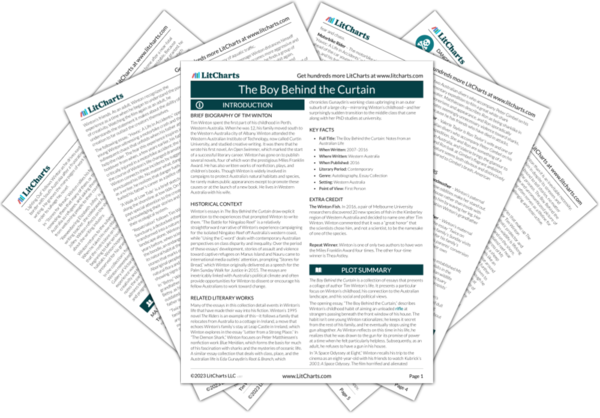In the autobiographical stories that make up The Boy Behind the Curtain, author Tim Winton establishes himself as an emphatic protector and lover of nature. His stewardship of Australian wildlife is lifelong and includes childhoods spent in the ocean and on the shore, campaigning to preserve Ningaloo Reef, an isolated reef near Australia’s western coast, and tracking the progress of Mt Gibson Sanctuary, a nature reserve that was once a sheep station in Western Australia. Yet Winton often feels like an unlikely campaigner, rougher and less elite than those around him. He also participates in contradictory habits that further complicate his relationship to nature. For instance, he loves to fish, but he also campaigns for an imperiled reef. And though he understands the need to protect and preserve nature, he at one point drives his huge vehicle through a protected piece of the Australian wilderness. These contradictory habits suggest that humans don’t have to sever their relationship with nature in order to protect it—rather, he thinks it’s possible to simultaneously protect and continue to enjoy the natural world. Winton thus suggests that if humans want to enjoy and benefit from the delicate ecosystems of the planet, they must also respect them. As long as humans honor this relationship with nature, both can continue to benefit.
Nature ThemeTracker

Nature Quotes in The Boy Behind the Curtain
If you can ever know something you’ll understand it by what it has given, what it owes, what it needs. It has never existed in isolation. And ghosting forever behind its mere appearance is its holy purpose, its billion meetings with the life urge in which it has swum or tumbled or blossomed, however long or however briefly.

Unlock explanations and citation info for this and every other The Boy Behind the Curtain quote.
Plus so much more...
Get LitCharts A+It takes a while for it to sink in, but the closer you get to the desert, the more life there is in the land; once you’re fully beyond the reach of modern cultivation there are trees again, and from their shadows come enough birds, reptiles and mammals to let you feel you are finally back in Australia. Each time I traverse the dead zone of the wheatbelt and reach this territory, my mood lifts—and then I think, What kind of man cheers up at the sight of roadkill?
Still hunkered by the old warren, Underwood confessed to a conviction that somehow, one day, the boodie would return to Mt Gibson. His tone was wistful but also defiant, as if over time he’d inured himself to ridicule on this point. I thought again of the potent space that an absence becomes. The lost boodie is just a part of a wider absence, a pattern of extinction that haunts this continent.
Ashore there’s a wary osprey astride a bleached stump and beneath him the charred remains of a bonfire from last winter. Drop your face back in and it’s something out of Kubrick, all hurtling colours and shapes and patterns so intense as to be slightly mind-bending.
It seemed to me at the time that this movement might have been named after the wrong colour, that nothing was as likely to stir the imagination of Australians so much as the sea. With Save Ningaloo we stumbled onto the only sacred site in the mind of mainstream Australia—the beach. Somehow the childhood memory of clean seas and the workaday longing for respite in salty air and the dream of retiring to a still-living coast resonate in the suburbs like nothing else.
A few days ago I woke with a light shining in my face. I thought I’d fallen asleep reading and left the bedside light on. But no, it was the sun shining in the window, warm and strong and clean for the first time since we arrived. Spring had come, and it made me think of home.
In the wake of that cold, sweaty minute in the Astor it wasn’t as if I was consciously and constantly afraid of sharks but they were a liminal presence thereafter, something lurking in the water beyond the pleasure of the moment. It hardly ruined my life but it did divide the mind in a way that was new. For along with the creaturely joy of snorkelling in the open water behind the reef there was now a twitch of anxiety. The eye searched for something even when I wasn’t looking.
As I bore down upon them I saw the two wedgetails had the body of a third eagle between them. A little unlikely, but there it was. Probably mown down by a truck. They were struggling over the carcass, each bird with a wingtip in its beak so that in the midst of this tug of war the dead raptor rose from the gravel to its full span, dancing upright, feathers bristling in the wind. I was tired and slightly loopy, it’s true, but it looked to me as if that eagle were taunting me, capering at the roadside as if to say, Here I am, not gone yet!
The good old days may be long gone, yet here we are, as ever, launching a boat from the beach in a quiet bay under cloudless skies, bobbing on clean water. In an hour we’ll have enough sweet-tasting fish to feed two households.











